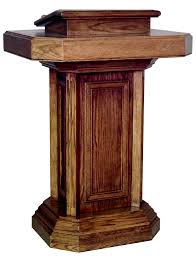记忆方法
1. cockpit pulpit.
2. 记忆方法:pull + pit => pulpit => 将其拉上讲坛。
3. 该词其后的一些引申义很可能受到了单词 pit 的影响。
4. “布道石”,是一个非常诗意化的翻译,也是挪威旅游网站的官方译名。挪威语为“Preikestonlen”,英语则为“Pulpit Rock”。没有找到什么典故,猜想称为“布道石”大约是因为它的形状,对外国人来讲仿佛教堂里的牧师讲台,而对中国人,则太适合想象中的古人或者仙人,从天而降,在这样壮阔的风景中授业布道了吧?=> http://blog.sina.com.cn/s/blog_6484adc00100rgo5.html
5. bully pulpit: 天字第一号讲坛(白宫).
2. 记忆方法:pull + pit => pulpit => 将其拉上讲坛。
3. 该词其后的一些引申义很可能受到了单词 pit 的影响。
4. “布道石”,是一个非常诗意化的翻译,也是挪威旅游网站的官方译名。挪威语为“Preikestonlen”,英语则为“Pulpit Rock”。没有找到什么典故,猜想称为“布道石”大约是因为它的形状,对外国人来讲仿佛教堂里的牧师讲台,而对中国人,则太适合想象中的古人或者仙人,从天而降,在这样壮阔的风景中授业布道了吧?=> http://blog.sina.com.cn/s/blog_6484adc00100rgo5.html
5. bully pulpit: 天字第一号讲坛(白宫).
中文词源
pulpit 小讲坛
来自拉丁语pulpitum,讲经台,小讲坛,词源不详。可能来自PIE*ped,脚,词源同foot,pilot.字母d,l音变,比较pilot.
英语词源
- pulpit
-
pulpit: [14] Classical Latin pulpitum, a word of unknown origin, denoted ‘platform, stage’. This sense was originally carried over into English (Miles Coverdale, in his 1535 translation of II Chronicles 6:13, wrote ‘Salomon had made a brasen pulpit … upon the same stood he’, where the 1611 Authorized Version was later to have ‘Solomon had made a brasen scaffold … and upon it he stood’).
But it was eventually swamped by a subsidiary sense which emerged in medieval Latin: pulpitum had been applied particularly to platforms on which people stood to speak in public, and in ecclesiastical usage it came to denote a ‘raised structure on which preachers stand’.
- pulpit (n.)
- early 14c., from Late Latin pulpitum "raised structure on which preachers stand," in classical Latin "scaffold; stage, platform for actors," of unknown origin. Also borrowed in Middle High German as pulpit (German Pult "desk"). Sense of "Christian preachers and ministers generally" is from 1560s. Pulpiteer, old contemptuous term for "professional preacher," is recorded from 1640s.
权威例句
- 1. I spoke from the pulpit ad lib.
- 我在讲坛上发表即兴演说。
- 2. He vituperated from the pulpit the vices of the court.
- 他在教堂的讲坛上责骂宫廷的罪恶.
- 3. The pews, the pulpit and the altar are of a piece with the simple elegance of the church itself.
- 长木椅 、 布道坛和祭坛都与教堂朴素高雅的气氛一致.
- 4. The pulpit is against horse racing on Sunday.
- 教士们反对星期天赛马.
- 5. All the young men at Pulpit Hill who were eligible - those who were twenty - one - were going into service.
- 讲坛山上所有适龄的青年 -- 也就是说,所有二十一 岁 的青年 -- 都去入伍了.

